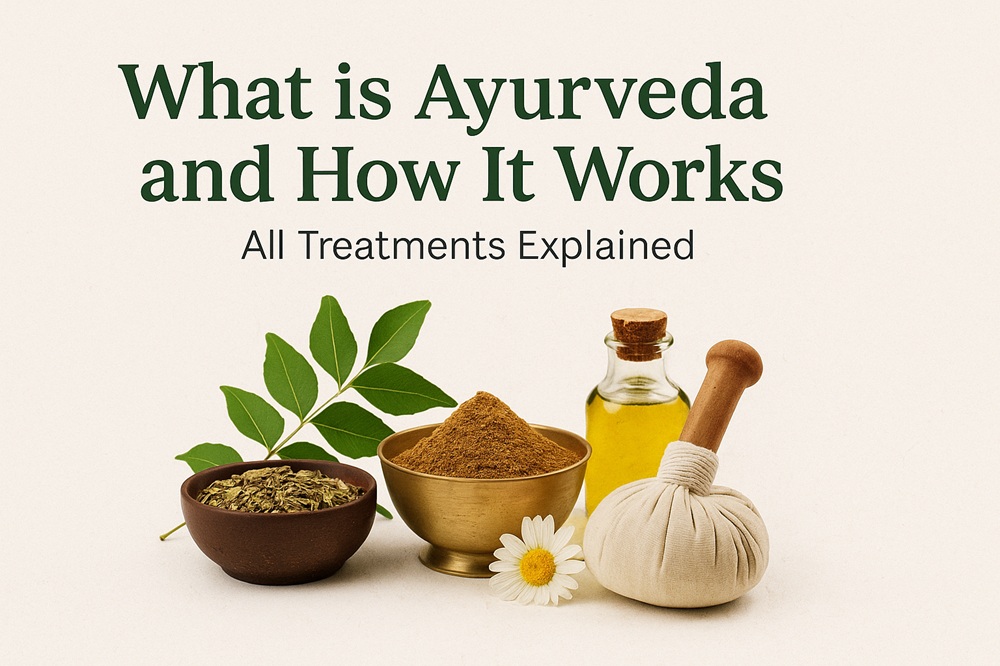Ayurveda is more than a medical system — it is a way of life that brings harmony to the body, mind, and spirit. With a history of over 5,000 years, Ayurveda is considered one of the oldest and most holistic healing systems in the world. Unlike modern medicine, which often targets symptoms, Ayurveda treats the root cause of disease, focusing on prevention, personalized healing, and natural balance — without side effects.
🌱 What is Ayurveda?
Ayurveda, derived from the Sanskrit words “Ayur” (life) and “Veda” (science or knowledge), literally means “The Science of Life.” It teaches that every individual has a unique constitution or Prakriti, governed by three biological energies called Doshas: Vata, Pitta, and Kapha. Health is a state of balance between these doshas, while disease arises when they are disturbed due to lifestyle, diet, stress, or environment.
The goal of Ayurveda is not only to cure disease but to promote health, longevity, and mental clarity through natural therapies, food, yoga, meditation, and routine.
🧬 How Does Ayurveda Work?
Ayurveda works by:
-
Understanding Your Body Constitution (Prakriti):
Through pulse diagnosis (Nadi Pariksha), tongue analysis, skin tone, lifestyle assessment, and mental state, the doctor identifies your dominant dosha and imbalances. -
Finding the Root Cause (Nidana):
Ayurveda believes every symptom is a sign of internal imbalance. By tracing the cause, it ensures deep and permanent healing. -
Personalized Treatment (Chikitsa):
Based on your dosha, age, disease stage, and digestive strength (Agni), a customized plan is created that includes detox, herbal remedies, therapies, food, and lifestyle changes. -
Strengthening the Body & Mind:
Ayurvedic medicine aims to rebuild immunity (Ojas), strengthen digestion, clear toxins (Ama), and calm the mind using herbs, oils, routines, and mindfulness.
🌿 Types of Ayurvedic Treatments
Ayurveda includes a wide variety of treatments, classified into detoxification, rejuvenation, therapeutic care, and preventive wellness. Here are the major types:
🧼 1. Panchakarma (Fivefold Detox)
Panchakarma is a cornerstone of Ayurveda used to cleanse the body, rejuvenate organs, and eliminate deep-rooted toxins.
-
Vamana – Therapeutic vomiting to remove Kapha toxins from the stomach
-
Virechana – Purgation to cleanse liver and intestines, balancing Pitta
-
Basti – Medicated enemas to regulate Vata and cleanse the colon
-
Nasya – Nasal oil therapy to detoxify the sinuses and head region
-
Raktamokshana – Bloodletting for treating blood-related disorders
🪔 2. Abhyanga (Herbal Oil Massage)
A full-body massage using warm medicated oils tailored to your dosha. It improves circulation, relaxes the nervous system, and enhances skin tone.
🌊 3. Shirodhara
A calming therapy where warm oil is poured on the forehead. Excellent for insomnia, anxiety, headaches, and mental stress.
🧴 4. Kizhi (Herbal Bolus Therapy)
Hot pouches of herbs, leaves, or sand are applied to relieve muscular pain, stiffness, arthritis, and neurological conditions.
-
Podi Kizhi – Dry herbal powder
-
Ela Kizhi – Fresh leaves
-
Navara Kizhi – Rice cooked in milk and decoctions
⚖️ 5. Udwartana (Herbal Powder Massage)
A dry massage using upward strokes and medicated powders to break down fat, improve circulation, and tone muscles — ideal for weight loss and cellulite.
🩹 6. Lepam
Application of fresh herbal paste to inflamed or infected areas — useful in skin diseases like psoriasis, acne, and eczema.
🧘 7. Nasya (Nasal Cleansing)
Instilling medicated oils or decoctions into the nostrils to cleanse and strengthen the head region — used for sinusitis, migraine, and memory enhancement.
💆 8. Pichu
Cotton pads soaked in warm medicated oil are placed on specific areas (head, lower back, joints) for local pain, stiffness, or degeneration.
💨 9. Swedana (Steam Therapy)
Herbal steam is applied to open the channels, reduce stiffness, and expel toxins through sweat. Commonly done after oil massage.
🌼 10. Rasayana (Rejuvenation Therapy)
Rasayana promotes longevity, strengthens immunity, and revitalizes tissues using specialized herbal formulas, tonics, and therapeutic diets.
🩺 Conditions Treated by Ayurveda
Ayurveda is effective in managing both acute and chronic conditions naturally, including:
-
Arthritis, Joint Pain, Sciatica
-
Psoriasis, Eczema, Fungal Infections
-
Diabetes, Thyroid, PCOS
-
Infertility, Sexual Wellness
-
Paralysis, Stroke, Nerve Weakness
-
Asthma, Allergies, Bronchitis
-
Digestive Disorders (IBS, Acidity)
-
Stress, Anxiety, Insomnia
-
Obesity & Metabolism Disorders
-
Migraine, Hair Loss, Skin Aging
❓ Is Ayurveda Safe?
Yes, Ayurveda is safe when practiced by qualified professionals. Treatments are done using herbs, oils, minerals, and natural compounds — all formulated according to traditional texts and modern safety standards. No synthetic drugs. No harmful chemicals. Minimal to no side effects.
🌍 Who Can Take Ayurvedic Treatment?
Ayurveda is safe for:
-
Children and adults
-
Elderly individuals
-
Pregnant and postpartum women (with expert guidance)
-
NRI and international patients
-
People with chronic illnesses or lifestyle-related conditions
🔚 Conclusion
Ayurveda is not just a system of medicine — it is a lifestyle of balance and self-awareness. By restoring harmony in the body’s natural energies and detoxifying the system, Ayurveda empowers you to live healthier, longer, and free of disease — without dependency on synthetic drugs. Whether you’re suffering from a chronic illness or seeking long-term wellness, Ayurveda offers a safe, natural, and personalized path to healing.


0 Comments